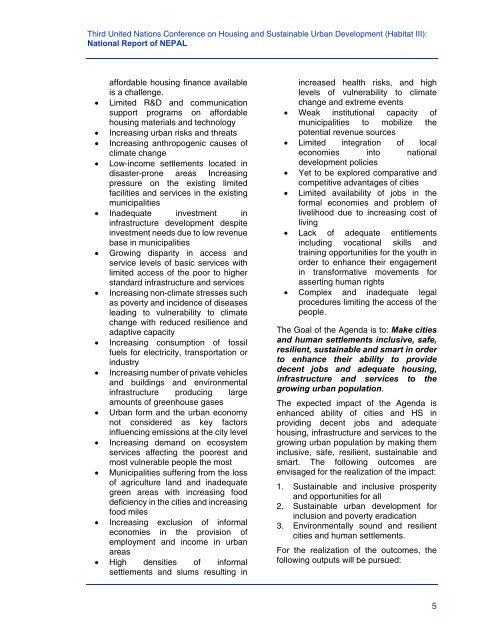Inclusive Cities Resilient Communities
Nepal-Habitat-III-National-Report
Nepal-Habitat-III-National-Report
You also want an ePaper? Increase the reach of your titles
YUMPU automatically turns print PDFs into web optimized ePapers that Google loves.
Third United Nations Conference on Housing and Sustainable Urban Development (Habitat III):<br />
National Report of NEPAL<br />
<br />
<br />
<br />
<br />
affordable housing finance available<br />
is a challenge.<br />
Limited R&D and communication<br />
support programs on affordable<br />
housing materials and technology<br />
Increasing urban risks and threats<br />
Increasing anthropogenic causes of<br />
climate change<br />
Low-income settlements located in<br />
disaster-prone areas Increasing<br />
pressure on the existing limited<br />
facilities and services in the existing<br />
municipalities<br />
Inadequate investment in<br />
infrastructure development despite<br />
investment needs due to low revenue<br />
base in municipalities<br />
<br />
<br />
<br />
<br />
<br />
<br />
<br />
Growing disparity in access and<br />
service levels of basic services with<br />
limited access of the poor to higher<br />
standard infrastructure and services<br />
Increasing non-climate stresses such<br />
as poverty and incidence of diseases<br />
leading to vulnerability to climate<br />
change with reduced resilience and<br />
adaptive capacity<br />
Increasing consumption of fossil<br />
fuels for electricity, transportation or<br />
industry<br />
Increasing number of private vehicles<br />
and buildings and environmental<br />
infrastructure producing large<br />
amounts of greenhouse gases<br />
Urban form and the urban economy<br />
not considered as key factors<br />
influencing emissions at the city level<br />
Increasing demand on ecosystem<br />
services affecting the poorest and<br />
most vulnerable people the most<br />
Municipalities suffering from the loss<br />
of agriculture land and inadequate<br />
green areas with increasing food<br />
deficiency in the cities and increasing<br />
food miles<br />
Increasing exclusion of informal<br />
economies in the provision of<br />
employment and income in urban<br />
areas<br />
High densities of informal<br />
settlements and slums resulting in<br />
increased health risks, and high<br />
levels of vulnerability to climate<br />
change and extreme events<br />
Weak institutional capacity of<br />
municipalities to mobilize the<br />
potential revenue sources<br />
Limited integration of local<br />
economies into national<br />
development policies<br />
Yet to be explored comparative and<br />
<br />
competitive advantages of cities<br />
Limited availability of jobs in the<br />
formal economies and problem of<br />
livelihood due to increasing cost of<br />
living<br />
Lack of adequate entitlements<br />
including vocational skills and<br />
training opportunities for the youth in<br />
order to enhance their engagement<br />
in transformative movements for<br />
asserting human rights<br />
Complex and inadequate legal<br />
procedures limiting the access of the<br />
people.<br />
The Goal of the Agenda is to: Make cities<br />
and human settlements inclusive, safe,<br />
resilient, sustainable and smart in order<br />
to enhance their ability to provide<br />
decent jobs and adequate housing,<br />
infrastructure and services to the<br />
growing urban population.<br />
The expected impact of the Agenda is<br />
enhanced ability of cities and HS in<br />
providing decent jobs and adequate<br />
housing, infrastructure and services to the<br />
growing urban population by making them<br />
inclusive, safe, resilient, sustainable and<br />
smart. The following outcomes are<br />
envisaged for the realization of the impact:<br />
1. Sustainable and inclusive prosperity<br />
and opportunities for all<br />
2. Sustainable urban development for<br />
inclusion and poverty eradication<br />
3. Environmentally sound and resilient<br />
cities and human settlements.<br />
For the realization of the outcomes, the<br />
following outputs will be pursued:<br />
5


